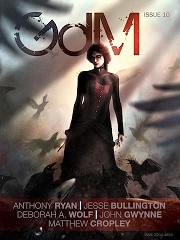“The Lady of Crows” by Anthony Ryan
Reviewed by Jason McGregor
Grimdark #10 provides us with several pieces of non-fiction for about the first third of the magazine but only a single novella for the last almost 20,000 words.
“The Lady of Crows” by Anthony Ryan
Subtitled “A Raven’s Shadow Novella,” which apparently ties it in to a trilogy of novels by the author, this story begins with a person running to a couple of “whores” for help after he’s crossed the port city’s criminal kingpin. They advise him to flee. The kingpin’s henchmen call on the two women but are misdirected. Later, one of the women is out working when she crosses paths with a murderous necrophiliac, said crossing orchestrated by one of the city’s merchants. The surviving woman hires some men and exacts incomplete vengeance on the merchant and thoroughly complete vengeance on the murderer. Ready to die in despair over the dead woman, she starts to take up her weapon when the cops show up but the dead woman’s voice dissuades her. So she’s imprisoned, but it turns out the king is holding her for a time before converting her into the titular “Lady of Crows,” which is to say, a sort of spy and all-around handywoman in his service. There follows the training montage as one of his other henchmen trains her. Her first major assignment involves guarding another land’s nobleman the king holds as a “guest.” The climax comes when she crosses paths again with the criminal kingpin.
As can be seen, this is a loosely plotted tale whose happenings don’t always necessarily follow from preceding events although there is usually some sort of free-association connection. For instance, her facility with vengeance really has little to do with anything she does in the king’s employ despite that being the reason he hired her, with her knowledge of cards only resulting in her being able to deal—she doesn’t end up playing. Her training might slightly assist her at some point in a melee but doesn’t seem to be the decisive factor. And so on. Little time is spent on the woman who dies, so we hardly care; much time is spent on the merchant though it’s not relevant to anything and doesn’t make much sense. (How is someone orphaned as an infant even supposed to lie that he knows that history and received any “tutelage” from his mother?) The style of the story is mostly of the “balding pate” variety (“Derla said nothing, watching the increasingly bright sheen of sweat form on Ratter’s balding pate.”), yet, right right before saying things like, “After employing her services for the better part of a week the fellow then avowed a disinclination to settling his bill, employing an unwise level of incivility,” it will have Derla say things like, “You two fuckheads want to fight, do it outside.” The secondary world has much mention of odd gods and odd names for things like (apparently) days of the week but doesn’t seem to add up to much. (The story does create an atmosphere of seedy squalor fairly well, though.) Despite all these faults, I read the story with little trouble. I think the only explanation is that I appreciated its having an emphasis, however flawed, on the story—having even simple figures move about in even loose action, as long as that was the focus and it had some vigor and an air of being an honest effort to provide some entertainment. So: fatally flawed, but vigorous.
More of Jason McGregor‘s reviews can be found on his Featured Futures blog.
 Grimdark #10, January 2017
Grimdark #10, January 2017